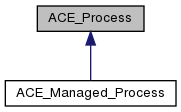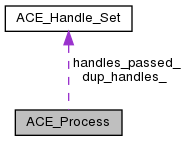A portable encapsulation for creating and managing new processes.
More...
#include <Process.h>
A portable encapsulation for creating and managing new processes.
ACE_Process provides a convenient way to:
- Spawn child processes, with convenient hooks for pre- and post-spawn actions
- Check if a spawned process is still running
- Kill a spawned child process
- Wait for a spawned child process to exit.
- See also
- ACE_Process_Options because it is used to pass options when spawning child processes.
-
ACE_Process_Manager for additional ways to manage spawned processes.
◆ ACE_Process() [1/2]
| ACE_Process::ACE_Process |
( |
void |
| ) |
|
◆ ~ACE_Process()
| ACE_Process::~ACE_Process |
( |
void |
| ) |
|
|
virtual |
◆ ACE_Process() [2/2]
◆ child()
| void ACE_Process::child |
( |
pid_t |
parent | ) |
|
|
virtual |
Called back from spawn() in the child's context just after forking. The default does nothing.
- Note
- This function is not called on Windows because the process-creation scheme does not allow it.
◆ close_dup_handles()
| void ACE_Process::close_dup_handles |
( |
void |
| ) |
|
◆ close_passed_handles()
| void ACE_Process::close_passed_handles |
( |
void |
| ) |
|
Close all the passed handles in the set obtained from the ACE_Process_Options object used to spawn the process.
◆ convert_env_buffer()
| wchar_t * ACE_Process::convert_env_buffer |
( |
const char * |
env | ) |
const |
|
private |
◆ exit_code() [1/2]
Return the process's exit code. This method returns the raw exit status returned from system APIs (such as wait() or waitpid() ). This value is system dependent.
◆ exit_code() [2/2]
Set this process's exit code. ACE_Process_Manager uses this method to set the exit code after successfully waiting for this process to exit.
◆ gethandle()
| ACE_HANDLE ACE_Process::gethandle |
( |
void |
| ) |
const |
|
inline |
Return the handle of the process, if it has one.
◆ getpid()
| pid_t ACE_Process::getpid |
( |
void |
| ) |
const |
|
inline |
Return the process id of the new child process.
◆ kill()
| int ACE_Process::kill |
( |
int |
signum = SIGINT | ) |
|
|
inline |
Send the process a signal. This only has an effect on operating systems that support signals, such as UNIX/POSIX.
◆ operator=()
◆ parent()
| void ACE_Process::parent |
( |
pid_t |
child | ) |
|
|
virtual |
Called back from spawn() in the parent's context just after forking, if the fork succeeds. The default simply returns.
◆ prepare()
Called back from spawn() just before spawning the child. If this returns non-zero, the spawn is aborted (and returns ACE_INVALID_PID). The default returns zero.
◆ process_info()
| PROCESS_INFORMATION ACE_Process::process_info |
( |
void |
| ) |
|
|
inline |
◆ return_value()
| int ACE_Process::return_value |
( |
void |
| ) |
const |
|
inline |
Return the process's return value. This method returns the actual return value that a child process returns or exits with.
◆ running()
| int ACE_Process::running |
( |
void |
| ) |
const |
Return 1 if running; 0 otherwise.
◆ spawn()
Launch a new process as described by options.
- Return values
-
| -1 | on failure; check errno for error code. |
| 1 | on success if the option avoid_zombies is set. |
| other | the process id of the newly spawned child. |
- Note
- The return value 1 may be changed in future versions of ACE to be the process id of the child will be returned regardless of the
avoid_zombies option.
-
On UNIX platforms, spawn() uses the execvp() system call if ACE_Process_Options::inherit_environment() returns true (which is the default) and execve() if not. Since execve() does not search PATH, the ACE_Process_Options::command_line() should include a full path to the program file.
◆ terminate()
| int ACE_Process::terminate |
( |
void |
| ) |
|
|
inline |
Terminate the process abruptly using ACE::terminate_process(). This call doesn't give the process a chance to cleanup, so use it with caution.
◆ unmanage()
| void ACE_Process::unmanage |
( |
void |
| ) |
|
|
virtual |
◆ wait() [1/2]
| pid_t ACE_Process::wait |
( |
ACE_exitcode * |
status = 0, |
|
|
int |
wait_options = 0 |
|
) |
| |
|
inline |
Wait for a previously spawned process to exit.
- status Points to a location to receive the exit status of the spawned process. Ignored if the value is 0.
- wait_options If
WNOHANG then return 0 and don't block if the child process hasn't exited yet.
- Return values
-
| -1 | the wait operation failed; consult errno for details. |
| other | the child process id is returned on success. |
◆ wait() [2/2]
Timed wait for a previously spawned process to exit.
- tv A relative amount of time to wait for the process to exit.
- status Points to a location to receive the exit status of the spawned process. Ignored if the value is 0.
- Return values
-
| 0 | the specified time period elapsed before the process exited. |
| -1 | the wait operation failed; consult errno for details. |
| other | the child process id is returned on success. |
- Note
- On UNIX platforms this function uses
ualarm(), i.e., it overwrites any existing alarm. In addition, it steals all SIGCHLD signals during the timeout period, which will break another ACE_Process_Manager in the same process that's expecting SIGCHLD to kick off process reaping.
◆ ACE_Process_Manager
◆ dup_handles_
Handle duplicates made for the child process.
◆ exit_code_
◆ handles_passed_
Set of handles that were passed to the child process.
◆ process_info_
| PROCESS_INFORMATION ACE_Process::process_info_ |
|
protected |
The documentation for this class was generated from the following files:


 1.8.14
1.8.14